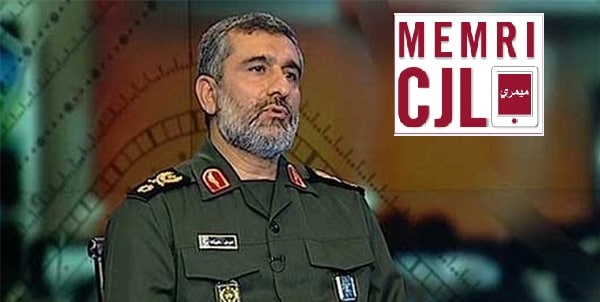Inrecent days, commanders of Iran's Islamic Revolutionary Guards Corps (IRGC) have referred extensively to Iran's offensive capabilities against U.S.targets, presumably in an attempt to deter the U.S. from taking military action, as well as economic measures, against Iran. IRGC Aerospace and Missile Force commander Amir Ali Hajizadeh boasted that the U.S. bases close to Iran are within range of its missiles, and expressed his pride in Iran's drone capabilities, which are based, inter alia, on American and Israeli drones that it has captured. Hamza Ali Kavyani, Iranian Army deputy naval coordinator,announced that Iran would soon equip its drones with anti-ship weapons and that it had already armed its submarines with cruise missiles. Basij commander Gholam-Hossein Gheibparvar said that Iran has adopted an offensive cyber strategy in order to confront the Western enemy, and former Basij commander and current IRGC cultural affairs director Mohammad Reza Naqdi called on the U.S. to"separate its affairs from those of the Zionists" and "move itsoutposts away from the Islamic ummah" if it wants to "emerge fromthis battle alive."
The following are excerpts from the statements by these commanders:
IRGC Aerospace And Missile Force Commander Hajizadeh: U.S. Bases Near Iran Are Within Range Of Our Missiles
In a November 22, 2018 interview on Iran's Channel 1, IRGC Aerospace and Missile Force commander Amir Ali Hajizadeh referred to the IRGC's missile and drone capabilities, saying: "The U.S. bases near Iran are within range of our missiles and are [easy] prey for us. For example, some of these bases are
300 or 400 km from us, such as the Al-'Udeid base in Qatar, the Al-Dhafra base in the UAE and [the base] in Kandahar [Afghanistan]. We even know the exact location of the U.S. RQ-170 [Sentinel] drone at the Kandahar base. These bases, which once threatened us, now present us with an opportunity.
"You have seen that our 700km-range ballistic missiles are accurate. We cannot use them in the Persian Gulf, but we can in the Sea of Oman. Just think: The American aircraft carries with 40-50 fighter planes and 6,000 crew are the center of our target.
"Today we have the largest collection of drones, war booty seized from the U.S. and Israel: the MQ, MQ1 [Predator], ScanEagle, and RQ-170 from the U.S., and the Israeli Hermes [drone]. In this area, we are in fourth or fifth place in the world, and in the region, and as far as the strength of our armed forces goes,we are in first place...

"For example, the Shahed 129 drone circled above the heads of the terrorists in Iraq and Syria in a 24-hour flight - and not only us but also the Syrian army, the Russians, and the Hizbullah forces have availed themselves of it. We have used it and used also a model we created from the American RQ-170 [captured intact by Iran after it was brought down in Iranian territory in December 2011]...
"The Syrian and Iraqi commanders who visited Iran and saw our air defense achievements were amazed, and the Iraqi commander, who was professional and experienced, said that he had seen French, Chinese, and Russian defense systems but that ours was better than those."
Basij Commander Gheibparvar: "The Basij's Cybernetic Activity Will Be Aggressive"
At the opening ceremony of the first Basij professional event focusing on creating digital content and online campaigns, on November 29, 2018, Basij commander Gholam-Hossein Gheibparvar explained Iran's strategy in this realm:
"[The need for creating and disseminating] digital content is not something that can be ignored. If the Basij does not enter this arena, others will instead. Cyberspace presents a golden opportunity for the country, and the first condition [for engaging in cyber activity] is presence in the arena and showing an offensive [strategy]."
Stressing that "the Basij's cybernetic activity will be offensive," Gheibparvar continued: "This is our strategy, and this arena [of activity] will be serious. We must not become mired in [internal] disputes [when we undertake this], and unity is the central principle of [our cyber strategy]. For this cybernetic division to be useful, each person must recognize his mission and know the importance of the arena he is in, because in this arena the enemy's apparatus is [already] perfect. We must believe in the war [that we are waging] in the media, since for most events in the world, the campaign is created in the cybernetic arena. For example, [President] Trump owes his victory to a virtual campaign, not to the press..."

Latest Posts



